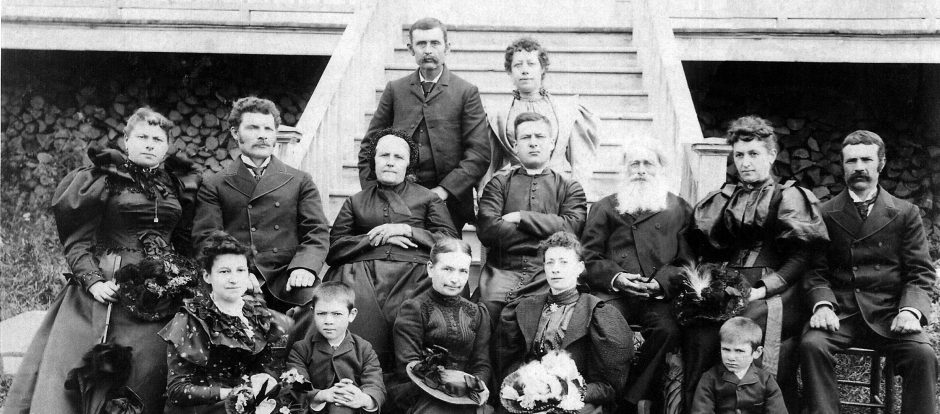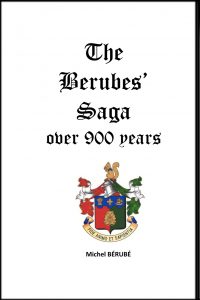In the spring issue of 2014, Le Monde Berrubey wrote of a trial that took place in 1304 that dealt with some fundamentals of British Common Law in matters related to real estate law.
There is nothing new in the fact that arguments about fencing and property limits find their way before the courts. Knowing this, it is even more amusing to trace in England, a trial that goes back to the reign of Edward 1st, from 1272 to 1307, that involves the Bereghby’s (also written as Berughby or Beruby). We found this trial in an old book that a lawyer (Alfred J. Horwood) published in London in 1864 under the title Chroniques and Memories of Great Britain and Ireland during the Middle Ages. In the original text dating from 1304, no less than 710 years ago, we can read in Old French Anglo-Normand, in the introduction to the judgment, the following passage :
“ Rauf le fiz Michel de Bereghby porta bref de intrusion vers Randolph de Bermegham, e demaunda une bove i de terre e demi e la moitié de un mees ii, en les queux il navait entre si par intrusion noun qe il fist après la mort de Roger de Berygby, a qi Michel sun pere ceu tenementz lessa a terme de sa vie iii. »
In English and more easily read by a bilingual person, it is explained that Ralph (Rauf) of Bereghby, son (fiz) of Michel, is suing Randolph of Bermegham (Birmingham) in which he defends himself for having taken, by force, by “abatement”, a piece of land that his father, Michel, had ceded to Roger de Berygby, before it was rented to Randolph by this person, Roger. The basic question is to know whether the land was taken by force or rather by virtue of some legal right. If litigation there is, it is that said property (this “tenement” in old French anglo-normand) was ceded, according to Rauf de Bereghby, as much as to one as to the other, or jointly to Roger de Berygby and to himself (Rauf is an abbreviation of the Normand surname Ranulf which was common at the time) : “ al intrusion respund il qar il temoyne qi lest eynz par le fet votre ancestre, e issent nent par intrusion. Ne puet ester dedit qe sun ancestre ne lessa joyntement a Roger et a Rauf iv. »
Randolph of Bermeghan maintains that the piece of land was only rented to Roger and Rauf, therefore, has no right whatsoever. It is interesting to note the lack of uniformity of the family name had Michel and Rauf de Bereghby been related to Roger de Berygby.
While all this is not perfectly clear, we are nevertheless able to guess at the reason for this trial. It is more than probable that the deceased (Roger), ceded to Randolph of Bermegham, the piece of land obtained from Michel. At the death of Roger, Rauf, considering himself to be the legitimate heir of his father Michel, who is described as an “ ancestor of fact “ and therefore a natural father, wanted to reclaim a part of this property. He found himself in conflict with Randolph who had already occupied the land entirely. There is a conflict between two rights, one as legitimate as the other. This trial is the occasion for a long and complex exposé on real estate law of the time. This trial ends in a stalemate based on a procedural flaw, the judges arriving at the conclusion that the introductory brief requested was not the appropriate procedure. We have the impression that the judges, unable to decide between two individuals each possessing real rights, came to this conclusion in order to wash their hands of the matter.
Where do these Bereghby’s / Berygby’s come from ? They surely came from the east of Northamptonshire where one can find numerous Berughby’s and Beruby’s, as I have already pointed out and notably from Denford, in the fief of Gloucester, where Berughby’s lived, also referred to as Beruby and Bereghby (the « u « and the « e « have the same pronunciation in old anglo-normand, which must have given Bereuwbé more often than Bereufbé, with the « gh »). These Beruby’s, at the time of the trial, are owners of a portion of the fief that belonged to their grandparents in 1240.
Taking into consideration the numerous instances of the names Jehan and Robert found among the first Berrube’s of Normandy in the XVIth century and that we are aware of, there is reason to believe that there exists a link. Similarily, the surnames Jehan (John) and Robert were very common in England at the time, as was the name William.
I wondered if this trial was not proof of the presence of Beruby’s in the agricultural world. Up until now, the numerous traces of our family name left in England seem to indicate that those bearing our name belonged to the Anglo-Normand minority. It would seem that the majority of people that bore our family name exercised professional functions, even prestigious ones, such as counsellors to the king, coroners, notaries, prosecutors, priests, vicars, monks, superiors of religious institutions or tradespeople, military persons and freemasons exercising a noble trade. It is true that others have left traces as landowners and as witnesses in property acts without these documents necessarily revealing the nature of their activities or the magnitude of the properties in question. In this case, we are speaking of a “bove” and a half and of one-half the space needed for a house and garden, the basic land requirements needed to establish a family.
Rauf would have been happy to obtain a part of the land which had previously belonged to Michel if his lawsuit had not been rejected. In this era, there must have been at least 90% of the earthly population that lived on and off of the land, often sheep herders in England and who, because of this fact, have largely remained anonymous. This trial that was based on the ownership of a parcel of land is indicative of the fact that there probably existed, at this time, a large number of persons with the name Beruby or Berruby or Berughby or Bereghby or Berygby or Berewby or Beroby and who we can know nothing of since they left no traces, much like the large majority of persons of the Middle Ages and probably due to the fact that they belonged to this agricultural world.
Michel Bérubé, president of AFB, #0338
i Abbreviation of the word « bovate » which, under Danish law at the time in the north-east of England was the equivalent of what an ox could plow in a year and estimated by some to be 15 acres.
ii Abbreviation of the word « messuage », a term which corresponds to a house on the site where it is situated, including, for example, the garden attached to the house.
iii page 146
iv page 151

